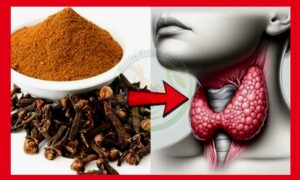
It’s understandable to look for natural relief when you have a sore throat. While many natural remedies have soothing and anti-inflammatory properties, it’s crucial to approach claims like “KILLS sore throat” and “natural antibiotic” with caution.
Here is a breakdown of effective, natural remedies that can help manage a sore throat and inflammation, along with important context about their limitations.
Soothing Natural Remedies for a Sore Throat
These remedies won’t “kill” an infection instantly, but they can significantly reduce pain, swelling, and discomfort while your body fights the illness.
1. Salt Water Gargle
▪️ Why it works: This is one of the most effective and scientifically backed methods. The salt helps draw moisture out of the inflamed throat tissues (reducing swelling) and creates a harsh environment for viruses and bacteria to thrive. It also helps to loosen mucus and flush out irritants.
▪️ How to use: Dissolve 1/2 teaspoon of salt in a glass of warm water. Gargle for 30 seconds, then spit it out. Repeat several times a day.
2. Honey and Warm Water or Tea
▪️ Why it works: Honey has natural antibacterial and antimicrobial properties. Its thick, viscous texture coats and soothes the throat, providing immediate relief from pain and scratchiness. It’s also a proven cough suppressant.
▪️ How to use: Stir a tablespoon of raw honey (like Manuka honey, which has particularly strong antibacterial activity) into a cup of warm water, herbal tea, or lemon water. Important: Never give honey to children under 1 year old due to the risk of botulism.
3. Ginger Tea
▪️ Why it works: Ginger has potent anti-inflammatory and antioxidant effects. Studies suggest it can help reduce inflammation and fight pathogens.
▪️ How to use: Steep fresh ginger slices in hot water for 10 minutes. Strain and drink. You can add honey and lemon for extra soothing power.
4. Licorice Root Tea
▪️ Why it works: Licorice root is a traditional remedy known for its soothing and anti-inflammatory properties. It can help thin mucus and ease throat irritation.
▪️ How to use: Steep licorice root tea bags or loose root in hot water. Note: Consume in moderation, as large amounts can have side effects, especially for people with high blood pressure.
5. Apple Cider Vinegar (ACV) Gargle
▪️ Why it works: Due to its acidic nature, some believe ACV can create an environment that kills bacteria. Its primary benefit for a sore throat is likely its ability to break down mucus. However, it can be harsh on tooth enamel, so it must be diluted.
▪️ How to use: Mix 1-2 tablespoons of ACV into a glass of warm water. Gargle for 30 seconds and spit out. Follow with a plain water rinse.
6. Chamomile Tea
▪️ Why it works: Chamomile is a gentle relaxant and has anti-inflammatory and antioxidant properties. Drinking it can help soothe the throat and promote rest, which is crucial for healing.
7. Turmeric “Golden Milk”
▪️ Why it works: The curcumin in turmeric is a powerful anti-inflammatory compound. Combining it with warm milk (dairy or plant-based) and honey creates a very soothing drink.
▪️ How to use: Mix 1/2 teaspoon of turmeric powder into a cup of warm milk. Add honey to taste.

The Critical “Natural Antibiotic” Distinction
While ingredients like garlic, ginger, and honey have documented antibacterial properties in lab studies, this does not mean they are equivalent to prescription antibiotics.
▪️ Concentration: The concentration of active compounds in food is much lower than in a prescribed antibiotic drug.
▪️ Targeting: Pharmaceutical antibiotics are designed to specifically target and kill certain types of bacteria without harming your own cells. Natural remedies have a much broader, less targeted effect.
▪️ Serious Infections: Relying on a “natural antibiotic” for a bacterial infection like strep throat is dangerous. Untreated strep can lead to serious complications like rheumatic fever or kidney inflammation.
When to See a Doctor
Do not rely solely on natural remedies if you experience any of the following:
▪️ A sore throat that is severe, persistent, or lasts longer than a week.
▪️ Difficulty breathing or swallowing.
▪️ A high fever (over 101°F or 38.3°C).
▪️ A rash.
▪️ Swollen lymph nodes that are tender or large.
▪️ White patches or pus on the back of your throat (a sign of strep throat).
Summary: A Soother, Not a Slayer
Think of these natural remedies as effective soothers and supporters of your body’s immune system, not magic bullets that “kill” a sore throat. They are excellent for:
▪️ Managing symptoms of a common viral cold.
▪️ Providing comfort while you rest and hydrate.
▪️ Supporting overall wellness.
However, for a suspected bacterial infection, it is essential to see a healthcare professional for an accurate diagnosis and appropriate treatment, which may include prescription antibiotics.
Disclaimer: This information is for educational purposes only and is not a substitute for professional medical advice. Always consult with a healthcare provider for any health concerns or before starting any new treatment.
